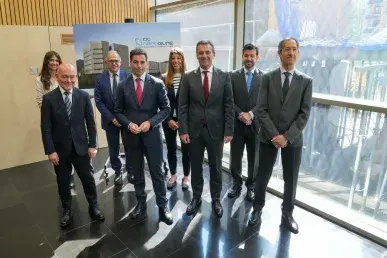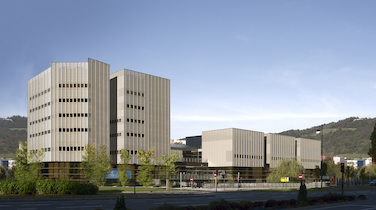NanoGUNE starts building the Quantum Tower
The Basque nanoscience and nanotechnology research center is reinforcing its commitment to quantum technologies with this 1,500 m²–expansion dedicated to the development of silicon-based quantum chips. The Quantum Tower consolidates nanoGUNE as a benchmark in quantum technologies and will house the center’s own research laboratories in these technologies as well as the Basque subsidiary of the British scale-up company Quantum Motion.

This morning, the Lehendakari Imanol Pradales (President of the Basque Autonomous Community), together with nanoGUNE’s CEO José Maria Pitarke, presented the project on the construction of the second CIC nanoGUNE tower—The Quantum Tower. The new tower will be housing both the laboratories of a new nanoGUNE research group in Quantum Hardware and the Donostia / San Sebastian subsidiary of Quantum Motion, a British scale-up company pioneering the development of quantum chips based on semiconductor technology.
Lehendakari Imanol Pradales reaffirmed the Basque Government's commitment to building an ecosystem of science, technology, and innovation based on collaboration between universities and research centers. Pradales also stressed the need to focus efforts on strategic areas: “We are a small country, and that means we have to make choices. To make a special effort in those areas in which we are stronger or regard as strategic.” With this perspective, he expressed his aspiration for the Basque Country to become an international benchmark: “We aspire to have an advanced and globally recognized research ecosystem. To become a significant player in certain areas of academia. To achieve this, having good universities does not suffice; we already have them. We need to take a step further and turn ourselves into a top-level university and research reference.”
He also highlighted the work of centers such as CIC nanoGUNE in attracting talent and driving forward a knowledge economy: “CIC nanoGUNE is helping us to move closer to both goals.” He concluded by emphasizing the commitment to developing a scientific ecosystem around quantum technology: “This commitment will help us to take another step forward in the quantum race, in which we aspire to be European benchmarks. To achieve this, we are building an entire scientific ecosystem linked to quantum technology, around which a powerful industry and economy are also developing.

The Quantum Tower will represent a 1,500 m2-expansion of nanoGUNE's headquarters. This expansion constitutes a clear commitment of the Basque nanoscience center to consolidate and reinforce its activity in the field of quantum technologies. José Maria Pitarke of nanoGUNE explained that “at nanoGUNE work has always been done in the field of quantum nanoscience. Now, the new Quantum Hardware group, led by Fernando González-Zalba, will have state-of-the-art infrastructure in the new tower to design and analyze quantum chips, and will also do so in collaboration with the British company Quantum Motion. Quantum computing processors, like those being developed, promise to help us solve highly complex problems, such as the design of new drugs or new sustainable materials.
The new Quantum Hardware research group, led by Ikerbasque Research Professor Fernando González-Zalba, will have a state-of-the-art research facility in the Quantum Tower, which will include advanced low-temperature systems and high-precision electronic instrumentation needed to design, manufacture, and characterize cutting-edge quantum hardware. González-Zalba stressed that the aim is “to build one of the most advanced quantum research facilities in southern Europe”.
NanoGUNE’s commitment focusses on silicon-based quantum chips –the same material that forms part of the microprocessors in our computers, smart phones, and cars–, thus taking advantage of the infrastructure and knowledge that has been built up over the years in the semiconductor industry. This technology integrates silicon quantum dots in silicon platforms, as qubits –the basic unit of information in quantum devices– for quantum computing and quantum technologies in general. This represents a promising alternative for the miniaturization and integration of quantum computing into existing systems, thereby opening up fresh opportunities for innovation and technological development.
The British scale-up company Quantum Motion, with whom nanoGUNE signed a collaboration agreement last June, is a pioneer in this technology. In the framework of this agreement, Quantum Motion is incorporating a Basque subsidiary to be located at the Quantum Tower, thus working closely with nanoGUNE's researchers in the field of Quantum Hardware. NanoGUNE's new research group in this field is expected over the next few years to recruit a team of at least 50 highly qualified people.
The construction of nanoGUNE's quantum tower is in line with the Basque Government's strategy to drive forward quantum technologies and turn the Basque Country into an international leader in this field, by providing a cutting-edge scientific infrastructure that will enhance its science, technology, and innovation ecosystem.
Alongside Lehendakari Imanol Pradales, today’s function was also attended by the CEO of nanoGUNE José Maria Pitarke, the Basque Government Minister for Science, Universities and Innovation Juan Ignacio Pérez, the president of nanoGUNE and CEO of CAF Javier Martínez-Ojinaga, the Basque Government Minister for Science and Innovation Adolfo Morais, and the Head of Innovation Maialen Agirre. After the presentation, accompanied by Fernando González-Zalba, leader of the Quantum Hardware research group, and Ainara García, Head of Technology Transfer at nanoGUNE, the Basque Government representatives were able to get a closer look at the progress of the construction work, and visit nanoGUNE's existing laboratories.
